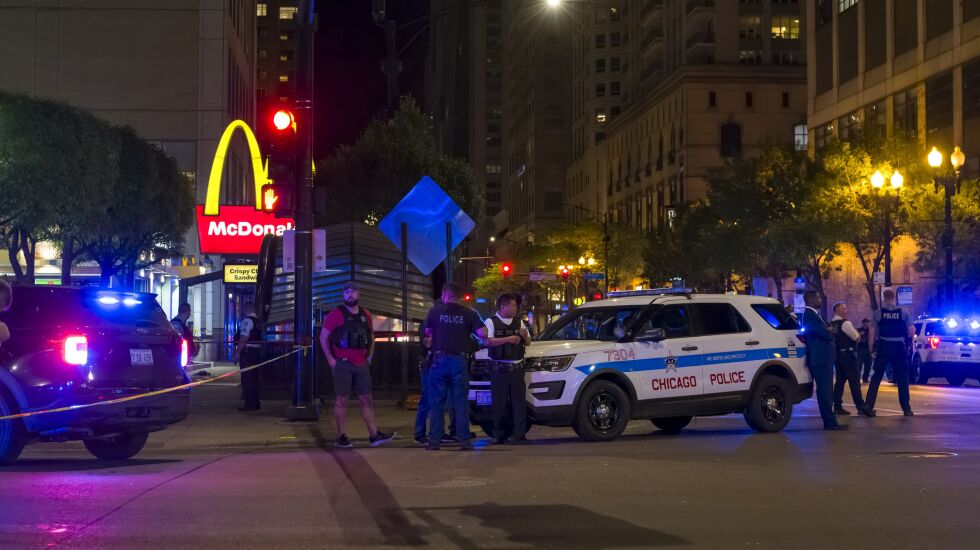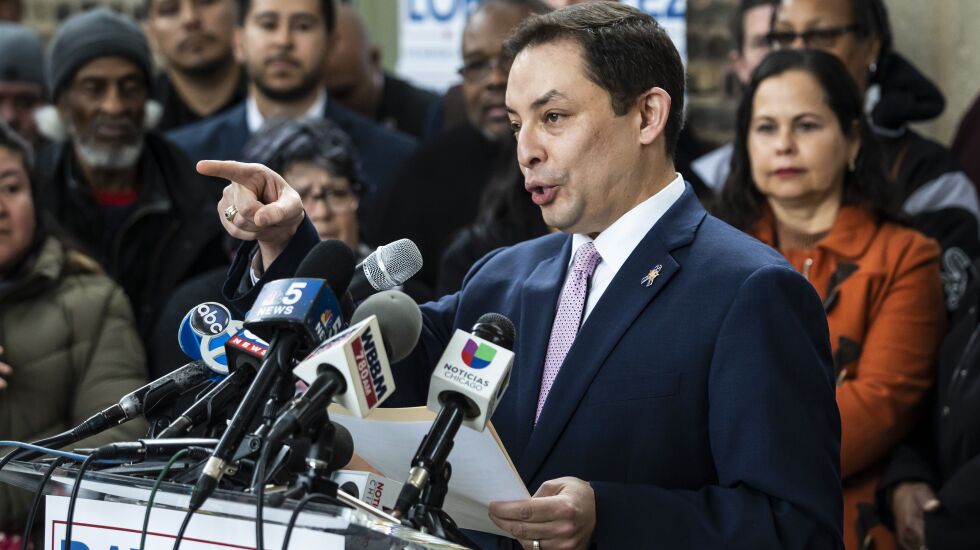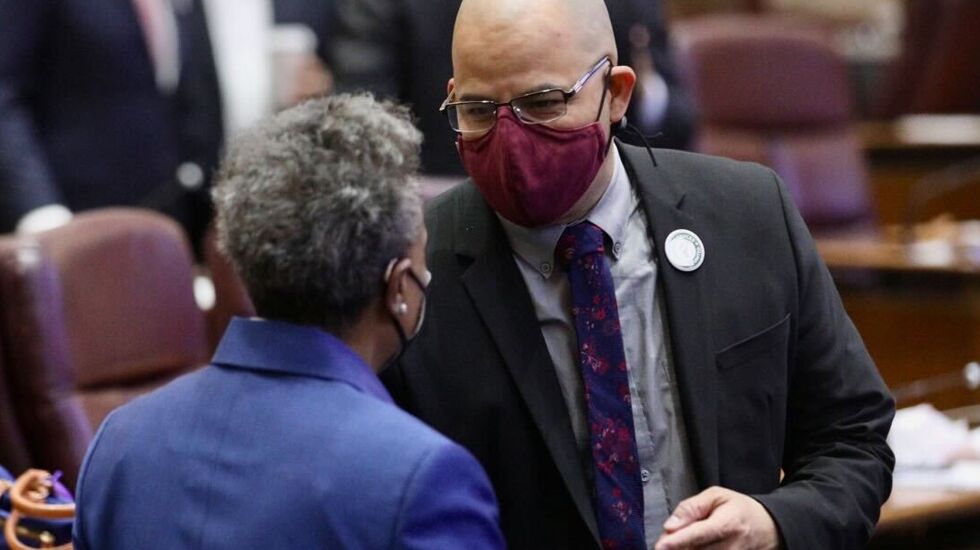
A divided City Council agreed Wednesday to strengthen Chicago’s seldom-enforced curfew law — to 10 p.m. for those 17 and under — in a desperate attempt to stop an outbreak of youth violence.
City Council members held their noses and made it happen Wednesday by a vote of 30 to 19 that did not come close to reflecting a barrage of criticism from all sides.
Public Safety Committee Chair Chris Taliaferro (29th) kicked off the emotional debate by warning of the violence that always happens in Chicago when temperatures rise.
“This summer, young people will die in this city. But what can we do today to prevent it?” Taliaferro, a former Chicago Police officer, told his colleagues.
“We’re now looking at over 800 murders a year. We, as elected officials, have to stand up and” try and prevent that from happening, he said in supporting the change from the existing 11 p.m. curfew for those 16 and under.
Still, aldermanic allies and critics alike condemned the crackdown as a toothless and desperate response that will likely have no impact on an outbreak of youth violence in the downtown area that culminated in the recent fatal shooting of a 16-year-old boy near the Bean in Millennium Park and a mass shooting on the Near North Side that left two people dead and seven others injured.
In fact, some alderpersons argued that the curfew changes might even make the problem of youth violence worse, as it reportedly has in cities including Washington D.C.
“This is just saying, ‘I dare you to break another rule.’ It’s ineffective. ... It’s telling our young people that we have no idea what to do with them, so let’s do something,” said Ald. Maria Hadden (49th), who voted against the law.
“Government cannot replace parents. This is not going to work. It’s not going to change anything.”
Ald. Carlos Ramirez-Rosa (35th) pointed to the research studies he distributed to colleagues that, purport to show tighter curfew laws have the opposite effect of what sponsors intend.
“A vote for this ordinance is a vote to increase gun violence,” he said, before he also cast a “no” vote.
Another curfew opponent, Ald. Jeanette Taylor (20th), said young people “would not be downtown” if they lived in communities that were “invested in.”
“I don’t have a skating rink. I don’t have a Chuck E. Cheese. I don’t have anything for young people to do,” Taylor said.
Obviously referring to the protests that followed the murder of George Floyd, she said, “Young people are the people who changed this country. What if Martin Luther King had a curfew? ... What pisses me off about this country is we wait `til something dramatic happens and then, we blame the young people we didn’t invest in.”
Taylor also fired back at the demand for more parental responsibility.
“And all of this notion about parents — I work 80 hours a week. How am I home?” she said.
Mayor denies curfew will increase violence
Speaking from the rostrum, Mayor Lori Lightfoot said it is “offensive and wrong and demonstrably false” to claim that the “modest changes” she asked the City Council to make in an ordinance that’s been on the books for decades is somehow going to increase violence against young people.
“This is not about just what happened downtown. It’s about what our communities are facing all over this city. … That these large gatherings that, unfortunately, have become magnets for shootings are a serious challenge for everyone,” Lightfoot said.
The mayor said she’s heard from “a lot of young parents who didn’t even know” that Chicago had a curfew.
“We’re actually giving them a tool that they can use to help enforce the rules,” the mayor said.
The goal is not to roll up the police wagons and fill them with young people gathering in groups, she said. The goal is to educate young people and convince them to act responsibly.
“In an era when we are trying to … get our police officers to be even more respectful of members of the community, you know what they do? They say, ‘Hey. It’s curfew. You’d better get along home. And the vast majority of our young people when those words are spoken to them say, ‘Okay. I’m on my way.’”
The modified ordinance puts the weight of law behind Lightfoot’s “emergency” executive order turning back the clock and age of Chicago’s 1992 curfew law — which applied to minors 16 and under and was enforced after 11 p.m. The new law applies to those 17 and under and starts at 10 p.m.
Chicago police will now be empowered to stop young people between the ages of 12 and 17 who are out in public without an adult after 10 p.m. and not either “exercising First Amendment Rights” or “participating in or returning home immediately after a ticketed of sponsored event” with a ticket stub or wrist-band to prove it.
The ordinance also maintains existing exceptions or “carve-outs” for young people traveling to and from jobs, schools, civic events or other “emergencies.”
Those without a legitimate excuse will be asked to return home. Those who refuse can be detained by police until a parent or guardian arrives at the local police station to pick them up.
Ald. Ray Lopez (15th), a candidate for mayor and Lightfoot’s most outspoken City Council critic, warned again Wednesday that demoralized and overworked Chicago police officers will, once again, be yanked out of neighborhood police districts “so we can have the curfew patrol downtown.”

Lopez pointed to the “80 percent drop” in curfew citations in recent years — from 2,453 citations in 2018 to 1,804 in 2019 and 635 citations in 2020. There were 364 last year and just 98 so far this year.
“This ordinance doesn’t address the issues of family and what’s going on in the community. All this does is escalate tensions between our youth and our city and our police officers. The same tensions that the city is trying to de-escalate,” Lopez said before voting against the law Wednesday.
No matter what the mayor claims, former-rapper-turned-Ald. Andre Vasquez (40th) believes curfew enforcement has and will continue to be race-based.
Vasquez recalled being “kicked out” of Grant Park and Navy Pier every weekend, “because I was a person of color out there literally just playing music with friends.”
“All this does is it criminalizes children of color and further segregates our city,” Vasquez said, his voice rising.

The American Civil Liberties Union of Illinois has raised similar concerns about the potential for the stricter curfew ordinance to be “implemented in a biased and discriminatory fashion.”
In a letter to Lightfoot last week, the ACLU warned police redeployments from neighborhood police districts “harm public safety in predominantly Black and Brown neighborhoods that already suffer the brunt of Chicago’s tragic gang violence.”
“Our biggest concern is how this ordinance will be enforced and who will be targeted for enforcement. Go back to the week-long curfew imposed after the George Floyd protests. There were 900 arrests. Three quarters of those arrests were African-Americans. That tells us that, when you have a broad law that allows for people to be stopped, questioned and, potentially detained, it can be enforced in a discriminatory way,” ACLU spokesman Ed Yohnka said.
With full Council approval of the mayor’s ordinance, the question is whether the ACLU will attempt legal action to overturn it and seek an injunction delaying enforcement in the meantime.
“Everything’s on the table,” Yohnka said earlier this week.







